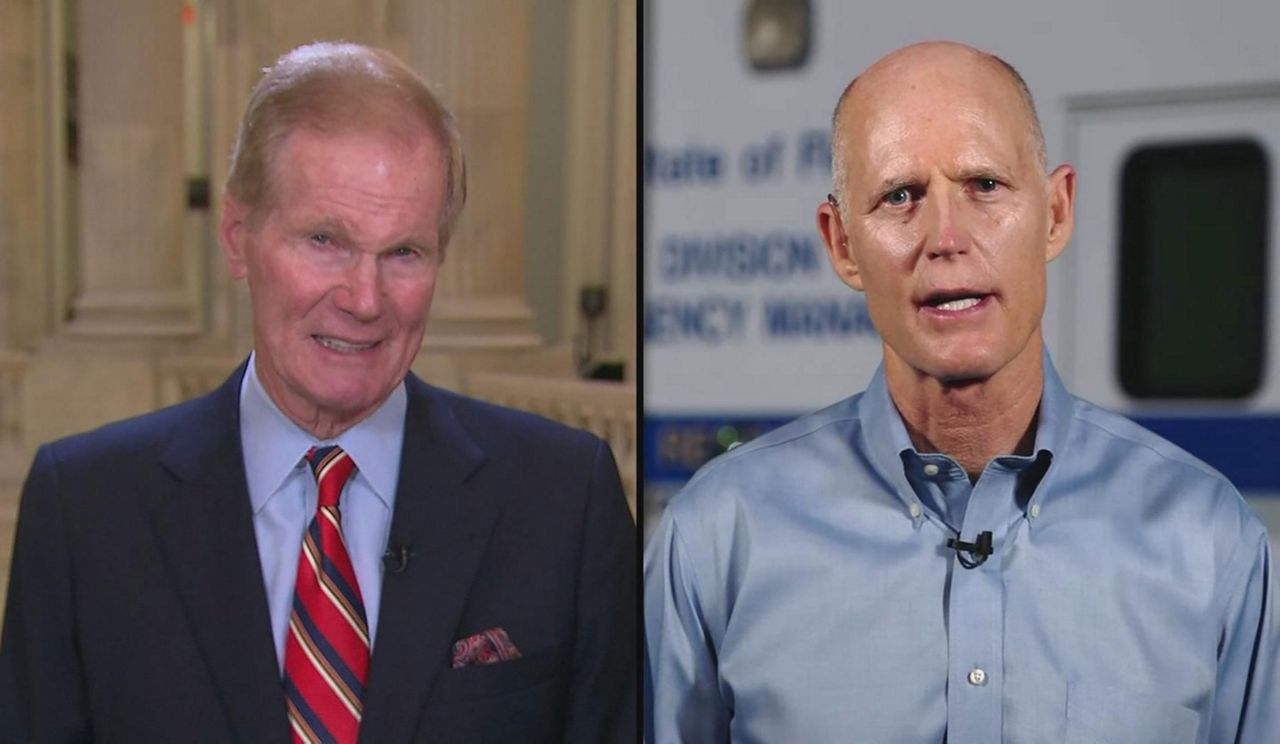ORLANDO, Fla. — With a razor-thin margin, the Florida U.S. Senate race between incumbent Democratic Sen. Bill Nelson and challenger Republican Gov. Rick Scott has yet to be called late into Election Night.
Although Scott gave a victory speech late Tuesday night, declaring himself the senator-elect, as of 12:10 a.m. Wednesday, a winner has not been officially declared, and Nelson has not conceded.
According to a Nelson campaign staffer, Nelson will not come out with a full statement until later Wednesday.
- LIVE ELECTION RESULTS: National, state, local races, plus all ballot issues ▼
- JUMP TO: Up-to-the-minute updates from our Spectrum News crews ▼
- FULL COVERAGE ON:
With 99.85 percent of precincts reporting, Scott had 4,047,079 votes, while Nelson had 3,990,719.
Florida’s two-term Republican governor is challenging incumbent Nelson for the seat that Nelson has held since 2001. Nelson is seeking his fourth term in the U.S. Senate.
Florida’s senior senator is perhaps one of the Democratic Party’s most vulnerable incumbents this cycle.
Experts say the race could help determine Republican or Democratic control over the U.S. Senate.
The back-and-forth scuffling between the candidates over ideologies, work records, and work ethic has been a hallmark throughout much of their campaigns.
In Nelson and Scott's first debate in early October, the candidates sparred over hot-topic issues such as immigration, gun rights, the economy, health care, and Puerto Rico.
Both used television ads to attack each other on matters such as work history and respective responses to crises such as hurricane recovery — especially in the advent of Hurricane Maria in 2017 and Hurricane Michael in 2018.
The U.S. Senate incumbent also blamed Scott in his televised debate for the effects of red tide in Florida, saying Scott “systematically disassembled the environmental agencies of this state” as Florida governor. Scott countered by saying nature is to blame for red tide, and that his office is spending millions of dollars to help impacted communities.
Campaigning aross Florida
In the days leading up to Election Day, both Nelson and Scott and their surrogates crisscrossed Florida to convince voters to support them in the race for U.S. Senate.
The Republican governor made stops in Tampa, Orlando, Jacksonville, Pensacola, and then back to South Florida.
Scott continued Election Day with harsher words for opponent Bill Nelson.
"The only job he's ever had is as a politician," Scott told Spectrum News. "So he's a talker, there's lots of talkers in D.C. I'm a doer. I'm going to change the direction of D.C."
Three-term incumbent Sen. Nelson not only made similar stops across the state, but on the day before Election Day, Nelson stuck to an old school method of campaigning — sign waving on street corners.
While the veteran Democrat has never faced an opponent quite like Scott, he chose to campaign the way he believed worked best.
“They like to see a candidate coming out there, with the people, asking directly for their votes," Nelson said.
A senior campaign adviser for Nelson's campaign discussed the challenge in campaigning in battleground states like Florida.
“I think Florida has become more of a divided state, and that makes things a little bit more challenging. I think there’s more money that’s been spent in this race than experienced previously... it’s been challenging, but (Nelson’s) weathered it... " said Pete Mitchell.
Campaign support and funding
The 2018 midterm elections have become the most expensive nonpresidential elections in U.S. history.
More than $5 billion has been raised at this point going to federal, state and local campaigns.
The two candidates have raised a combined $79 million, according to campaign finance reports from mid-October. Scott — whose estimated worth is more than $232 million — has reportedly spent almost three times as much as Nelson, pouring in $18 million of his own money into his campaign.
Outside groups spent $43 million in the Florida U.S. Senate race, fueling TV commercials, campaign mailers, and other support in an attempt to reach voters, according to Spectrum News reporter Samantha-Jo Roth. Nelson continues to be the biggest beneficiary of that cash.
Scott relied on big names in the GOP to bolster his campaign. President Donald Trump appeared at a rally in Tampa, and has made multiple Twitter endorsements on behalf of Scott. Vice President Mike Pence also made a campaign stop in Orlando earlier this year on behalf the Senate candidate.
As for Nelson's support, he relied on the rallying of fellow Democratic leaders. Former Vice President Joe Biden held a series of campaign stops in Florida with Democratic Party candidates such as Nelson, who also has the endorsement of Puerto Rico Gov. Ricardo Rosselló.
A Spectrum News exclusive SurveyUSA election poll conducted between October 18 and October 21 determined that Nelson was leading Scott by 8 points, 49 percent to 41 percent.
In a SurveyUSA poll conducted in September, Nelson trailed Scott by 2 points, but SurveyUSA stresses that poll results are fluid.
Reporters Greg Pallone and Samantha-Jo Roth contributed to this story.
APP USERS: Click here to view live updates from our crews.



